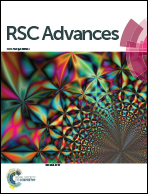Conventional polymer solar cells with power conversion efficiencies increased to >9% by a combination of methanol treatment and an anionic conjugated polyelectrolyte interface layer†
Abstract
The power conversion efficiency of PTB7:PC71BM polymer solar cells was improved to 9.1% by treatment with methanol followed by a water- and alcohol-soluble conjugated polyelectrolyte cathode interface layer. This improvement in efficiency is a result of a combination of an enriched PC71BM ratio on the top surface in the active layer and the presence of the preferred dipole at the cathode interface.


 Please wait while we load your content...
Please wait while we load your content...